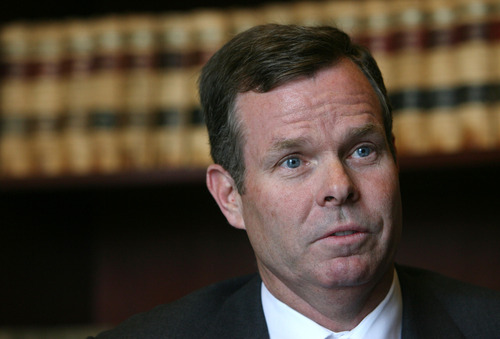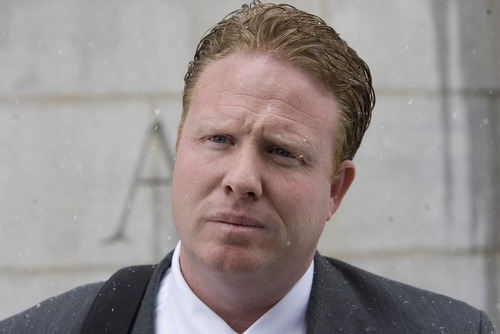This is an archived article that was published on sltrib.com in 2014, and information in the article may be outdated. It is provided only for personal research purposes and may not be reprinted.
Shadows of the investigations into former Utah Attorney General John Swallow crept Wednesday into the criminal case against Jeremy Johnson, the St. George businessman whose allegations sparked at least five probes of Swallow and others.
Johnson and four fellow defendants pleaded not guilty during a federal court hearing in Salt Lake City to a new indictment, the third in this case but one that makes only minor changes to some of the 86 charges connected to their operation of I Works, Johnson's massive online-marketing operation.
More than two years after the first indictment, the case is inching closer to trial. Magistrate Judge Paul Warner said he expects to schedule a trial date at the next hearing, set for March 12.
One of the biggest obstacles is delivering the millions of pages of possible evidence from I Works' computers to five defense attorneys in a form that allows them to search for specific information. A database expert hired by the court said much of that work should be completed within the next few weeks.
But Marcus Mumford, attorney for defendant Scott Leavitt, said he worries that several hard drives in the possession of the government may have had data deleted.
"There may be audio files in these things," said Mumford, adding that the hard drives apparently had been taken from I Works by the Federal Trade Commission, which sued the company, Johnson and others in December 2010 for allegedly defrauding consumers.
Assistant U.S. Attorney Robert Lunnen denied anything had been erased, and court-hired database expert Eric Wheeler said he also had found no such evidence.
"We haven't wiped clean any hard drives," said Lunnen, who recently replaced Brent Ward as lead prosecutor in the case.
Ward withdrew after he briefly became a candidate to replace Swallow, who announced his resignation in November in the wake of investigations into his conduct, including his ties to what Johnson described as an effort to stall the FTC's I Works inquiry.
Investigators hired by a special Utah House committee have said that nearly every electronic device Swallow used — cellphones, computers and hand-held units — had been wiped clean of data, starting in 2012 after Johnson pressed forward with a hardball campaign for the return of some of the monies his company and Leavitt had paid in the failed effort to derail the FTC investigation.
Recently released warrants show that investigators looking into the conduct of Swallow and predecessor, Mark Shurtleff, are interested in the relationship between Swallow and Ward and have sought emails between the two. Questions about Ward's relationship with Swallow also surfaced in the wake of a court hearing a year ago during which Johnson was poised to plead guilty but at which the deal fell apart.
As part of that hearing, Johnson produced two lists of people whom he claimed Ward had agreed not to prosecute in connection with the I Works investigation. Swallow's name appeared on one of the lists, which Ward agreed could be admitted into the official court record as part of the plea deal.
But U.S. Attorney for Utah David Barlow has denied the government agreed to immunity for Swallow.
In addition, Sen. Steve Urquhart has modified his earlier criticism of Ward's actions, saying he now believes Ward might not have intended to give Swallow immunity but rather was signaling in the hearing that the U.S. attorney's office had no intention to prosecute anyone else arising out of the investigation of Johnson's I Works company.
"It is plausible that Brent Ward intended with the plea deal to end all prosecutions related to I Works ... not that John Swallow's inclusion on the list had any particular significance," the St. George Republican wrote in a recent Facebook post. Urquhart did not return a phone call seeking further comment.
Twitter: @TomHarveySltrib





